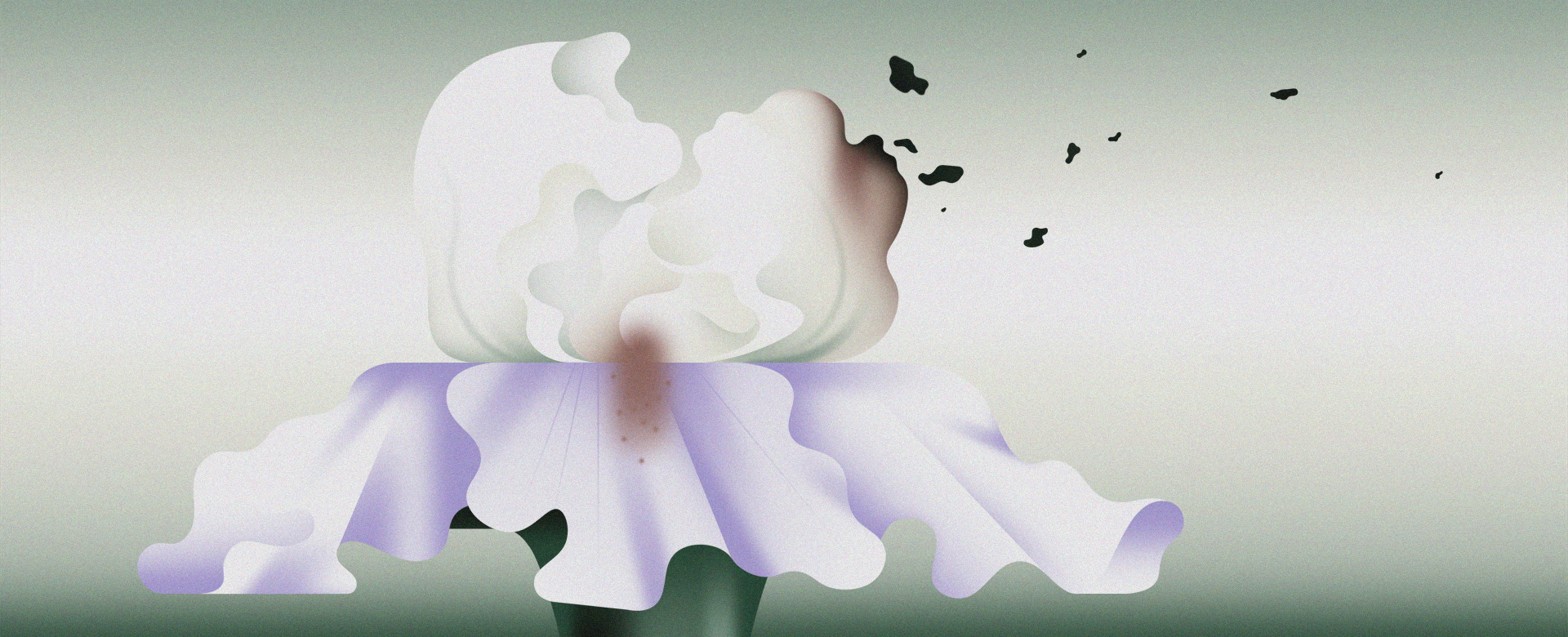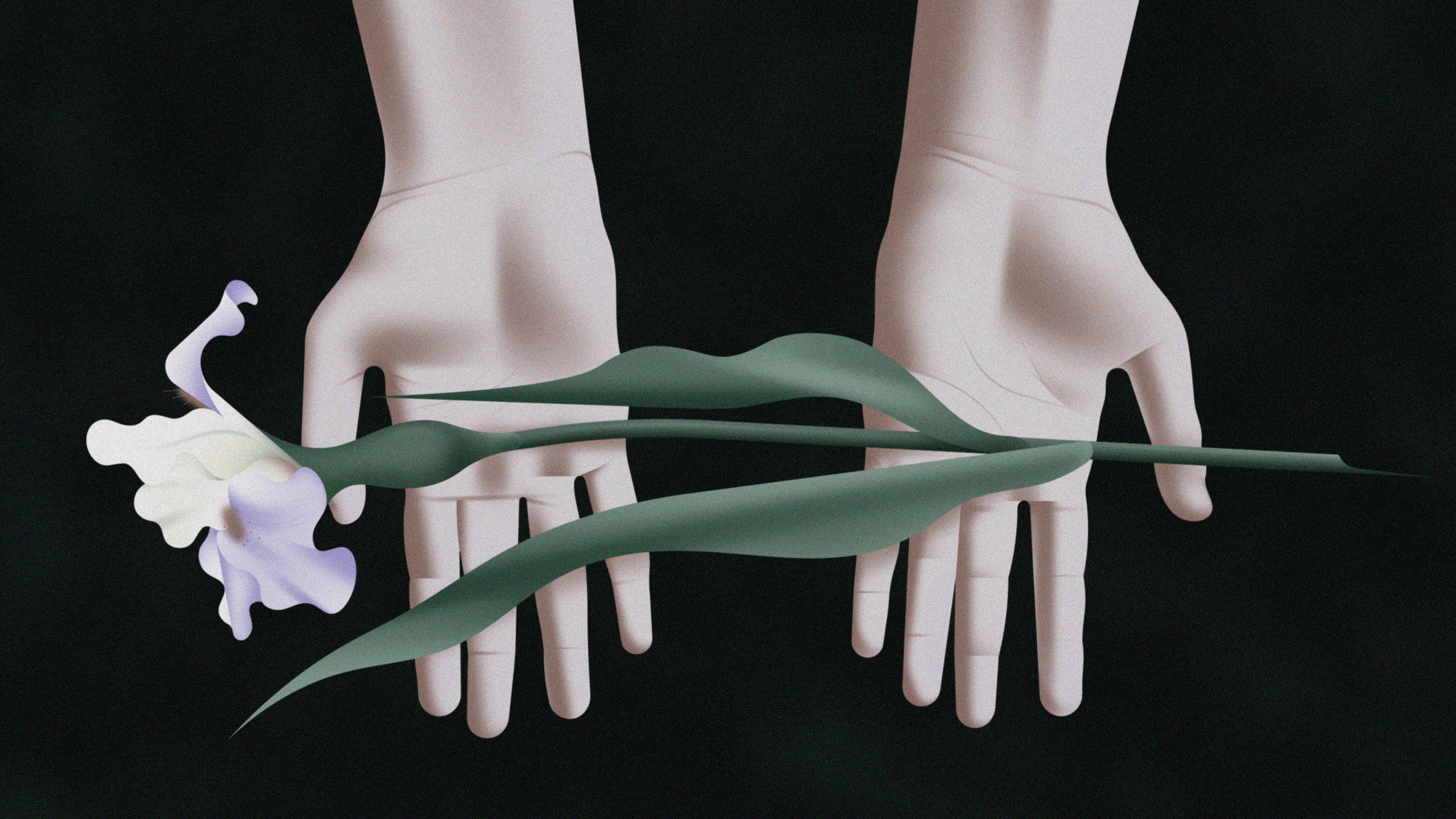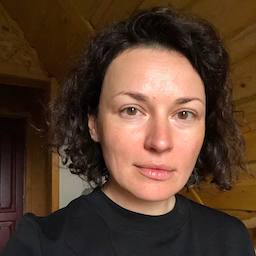
The garden remains
Grief can live side by side with green shoots, damp soil, and fragile petals. In gardening, our author found not answers, but the beginning of something. This story is about overcoming loss, the importance of conversations, and the power of orchards and flowerbeds.
A year before the big war, my younger sister died. It took a long time and excruciating effort for her to fight for her life. Sixteen surgeries, three months in remission – and COVID took her in the end. When I got a call from the clinic, my mind was ready for the formal “Good afternoon, Maryna Hryhorivna,” the name-and-patronymic thing that never brings any good news. My mind was ready, but my body wasn't. My body reacted by going numb suddenly like your hand sometimes goes numb when asleep and hangs down helplessly, and you wiggle it, flap it to bring it back to its senses, but there's no connection with the muscles. My whole body became that hand, disconnected from the command center, despite my mind's efforts to regain control.
Becoming the only child of a mother I'd never really gotten along with was frustrating. My sister was much closer to her, they'd had this co-dependent love-hate relationship, sometimes using me as an ally or a means of influence. I was an eventual partaker in their communication, and I got used to this role, as unexplainable to an outsider as it was.
When Anya was no more, it turned out that she’d been, in reality, the bridge. My mother and I started seeing each other, with the unfillable void palpable between us. I expected her to talk about Anya but she wouldn't. On the fridge door, there was a notebook page with my mother's spiky handwriting on it, “Today Anechka is no more.”
I'd see that note pinned in place with a magnet whenever visiting, and we'd never talk about it. I touched it for the first time when cleaning the apartment after my mother's death.
My mom died a year after my sister. She kept it secret, her cancer that showed up when Anya was fighting for her life. Perhaps, that was also how a connection between them worked. No one knew about my mom's disease, including her last boyfriend, until she ended up in the hospital to never be discharged. She never talked about it. I never asked. In our family, health issues stayed outside conversations until the ultimate takeover.
More than anything else, my mother hated dull people. Her sixty-year-old acquaintances who wouldn't jump at any adventurous opportunity were ‘old bustards.’ She despised hesitant men; she got married four times, certified in several professions, and possessed infinite imagination which, in other people's opinion, and mine in particular, made her a pathological liar. In other words, she was an adventuress, an egoist, and an extraordinary personality.
The latter was the reason why I was deeply affected not by her death but by her last month at the hospice when I could observe that extraordinary personality spiraling down and decomposing on drugs and infusions. She went all the way from acknowledging her imminent death to craving death, begging for it to come and take her.
She was given enough time to realize this: she'd never see again something she loved the most. Her garden. It was the only thing she'd talk about until she couldn't.
My mother died by the end of the first year of the big war, and her last days, perhaps for the first time, drew us closer to each other by making us share the same wish: for death to come sooner. In the middle of another air strike on Kyiv, I went down to the damp hospice basement together with nurses, and my mom was left upstairs in her bed surrounded by the maze of tubes; they couldn't take bed-ridden patients to the bomb shelter, in fact, there was no proper bomb shelter there. We stood there looking through the crack in the moldy basement door at the fluffy snow clumps falling carelessly in spite of rockets and explosions, and I felt anger. When is it going to end, when will death put an end to this continuation of the life that is good for nothing any more?
In the first days after my mother's death I felt relieved. Free. Then, slightly curious. About the person I'd lost connection with about twenty years before.

Going through the things in her apartment, I found all of my teenage photos meticulously laid out in small photo albums and hidden behind the bookcase – the little life I'd forgotten about was safely stored there. There was also a shoebox with hunter knives stacked inside elegant shoes, buried under a pile of fur coats. There were New Year garlands I last saw when decorating a Christmas tree together with my father; the garlands ‘were lost’ after my parents got divorced. Unexpected, obsolete, and illogical objects resurfaced from wardrobes and closets; they seemed to never cease, those things I was so desperately trying to get rid of. And then finally there was only one of them left to face, to deal with, to come to a final verdict on: her damn garden.
The land plot hidden amidst makeshift brick structures was part of the ‘go-getter cooperative’ as my mother would call it. She'd also refer to herself as a go-getter with considerable pride. It was sultry June, I drove to the garden cooperative on the left bank of the Dnipro and, not without neighbors’ help, found the gate. When I finally opened it, the familiar feeling washed over me: a close encounter with nature.
People tend to think of nature as something to protect and nourish. At least, people who never really dealt with nature would think so, with their experience confined to a pot on a windowsill or a flowerbed crammed between concrete apartment buildings. However, even these remnants of the immensely mighty force will make an attentive observer see the truth: this is a powerful adversary. Even humans, the most invasive species of all, can’t subdue nature entirely.
Only those dealing with nature closely for a long while would start suspecting that despite their destructive practices and extensive knowledge it's them who will be subdued and eventually digested. Nature always wins. It promptly takes over everything you deem yours and imposes its laws on something you've just thought you could control. You're an audacious fool if you think otherwise.
Those were my thoughts when I looked at waist-high weeds, raspberry canes winding all over the place, and roses clinging to the roof of the garden shed. Making a single step through that wilderness demanded considerable effort. I turned the weeds over, pushed the branches and canes away, stomped on the shrubs and eventually came to my senses weeding out the flowerbed to free the irises. I bent over to smell them, to let this scent of my childhood in, to inhale it again and again, insatiably. On my fours, I moved through the flowerbed, hiding my face between damp and fragile petals of irises, and felt better with each second.
By evening, the flowerbed acquired some respectability. My grandma would say so. She was a skilled gardener and unlike her village neighbors, dedicated a relatively small portion of her garden to vegetables and a larger portion to fruit orchards and flowerbeds. I spent the first five years of my life in that heaven. I knew the names of many herbs my grandma gathered in the meadows and dried in the cabin. Her favorite flowers were irises and dahlias. My first job ever was ‘go cut some for the dinner table’, and girl I'd go and cut.
My mother couldn't stand visiting that place, she hated her mother-in-law. Nevertheless, she left me there to be raised by her. My mother didn't have an affinity with the land, and I would've never suspected her of developing a love for gardening, it seemed too quiet a hobby for her. But I was wrong, again. It is by no means a quiet hobby, and my mother was devoured by it.
I realized it the moment I opened the door of the garden shed and saw that she in fact lived there, not in her city apartment. The space looked very much like herself, and the layout of the garden as well. Trees too close to each other, berry shrubs too dense, flowers and herbs impossibly mixed, a glasshouse stuck in the middle, the soil very well enriched – everything was like her character, intense, compulsive, overflowing, affectionate, and chaotic. The lack of space was compensated with the diversity of forms and colors. And in the middle of that opulence, a black patch of the cleared flowerbed. My flowerbed. Five hours of my labor.
I couldn't take my eyes off it.
I drove back to the Right bank over the Pivnichny bridge, the sun was setting ahead, the river shimmered pinkly, and my car interior was soaked in scents from the bucketful of flowers. I was absolutely happy. In the midsummer of 2023, mind you.
This story seems to veer off, and while I've intended to write about grieving and healing practices I feel out of my element in this domain. I haven't yet grasped all the losses and pains I went through. While some time has passed this new chore has made me happy amidst the totality of sorrow, I still struggle to deconstruct this experience, evaluate the parts, come to conclusions, and compose a practical therapeutic story. Writers aren't allowed to be unconfident in their writing, so I'll cling to the idea that I'm not a real writer; I produce half-cooked things like screenplays that never reach the audience in their original form. So this story will be not unlike the garden I cultivate spontaneously, with a cleared patch here and a peony bush crammed amongst the roses there.
Does it add to the restlessness of the garden, that is, this essay? Should we expect a product of culture to pursue structure, straightforwardness, and rhythm traceable all along? Perhaps, if I were an expert in horticulture or creative writing, we should have. Yet that tiny garden plot in the cooperative of go-getters has taught me something: the reality is always different from what you're used to thinking about it, especially the things that you'd think you knew.
Take grief. Our entire nation is grieving. Everybody has lost someone or something – their way of life, dreams, possessions, well-being, future, present, meaning, relatives, friends, the sense of self. Do these losses make us experts in grieving? Is every one of us capable of grasping our losses, accepting them, living through them, reflecting on them, and using them as common ground with the other? And most importantly, are we able to talk about loss with someone else?
I've tried my best to avoid references to psychiatry, and still, I must refer to this one thing: yes, talking the grief through can be a road to healing, but how exactly are we talking about our traumatic experience?
I find myself in a constant urge to compare, use metaphors, and refer to the image of grief established in our culture as if my personal experience of grieving would be inappropriate or unreal without those foundations. I want to substantiate it with narratives and forms I know from art and culture.
My body instantly reacted to my mother's death, but not my mind. My mind got stuck in a paradox: here's a life going on and here it is already ended, and now you must feel something, and it must be something different from what you've felt before. How does one grasp such a thing? So my body's reaction to stress was a malfunction: on the outside, I must have looked like someone disconnected from reality, bored in the morgue and smiling at the tiles. Would this image work in a film if I were directing one? Would I not be angry at an actor who can't express the change of state and show that something important has just happened? Our culture, and popular culture in particular that is fueled by the fear of non-existence, the greatest fear of all, has given us a very special disorder: when death happens near us, the most uncomfortable feeling is that your reaction is inadequate. Do we really have to express this feeling at once?
I didn't express it. I was bearing this feeling for three years because I seemed to have no way of verbalizing it. Normalizing it, yes, in that I seem to succeed. Death is normal. It is normal to live knowing about death. And be focused on living at the same time. One day death will happen to you but it hasn't yet – and look, here's something emerging from the soil. Look at a tiny seed lifting a patch of soil a dozen times heavier to bring a seedling to light. That seed is condensed aggression of nature, live evidence of its infinite power, an invitation to engage. Cultivation of a garden is nothing else but the canalization of anger which I can now direct at controlling the part of nature that gets in the way of my desired structure, color, or form. A fight for a fragile flower against invasive weeds by enriching the soil and applying physical force produces more dopamine than any conversation.
So I've found common ground with my mother. I'm in an ongoing dialogue with her forms incorporated in this land; I understand what she meant, and I understand why we need the biochemical cycle of gardening enthusiasts. It is a conversation through time by transforming space. At first, it’s hard to discern, but when you're included in the dialogue, you eventually find yourself at peace. At peace with the thought that your death doesn't change much because you still exist in something and speak through it.
Translated from Ukrainian by Olha Liubarska
Illustration: Zhenya Oliinyk
